|
|
|
Sort Order |
|
|
|
Items / Page
|
|
|
|
|
|
|
| Srl | Item |
| 1 |
ID:
097149
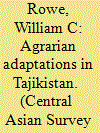

|
|
|
|
|
| Publication |
2010.
|
| Summary/Abstract |
In Central Asia, agriculture and water management have ranked as the two most important economic activities in this arid environment. These activities gained even more prominence during the Soviet era as planners expanded irrigation into previously marginal land that bolstered their vision that the best land be allocated exclusively for cotton production. In the wake of the fall of the Soviet Union, Tajikistan has enacted laws meant to expand and clarify land use categories to meet the dual targets of expanding food production within the country while maintaining as much land as possible in cotton production - their economic mainstay. To this end, the Tajik government instituted five categories of land tenure. Though comprehensive, these new dispositions merely mask a continuation of top-down agrarian decision making implemented during the Soviet period. Consequently, this change has created new problems for farm labourers as they struggle to adapt to post-Soviet life and negotiate with the new bureaucracy in the face of 'de-modernization' and the loss of jobs, wages, and in many cases, access to productive land. This research demonstrates that the means by which the Tajik government expanded food production has contributed to agricultural problems apparent at the time of independence.
|
|
|
|
|
|
|
|
|
|
|
|
|
|
|
|
| 2 |
ID:
097146
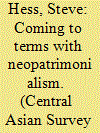

|
|
|
|
|
| Publication |
2010.
|
| Summary/Abstract |
The author examines how patrimonial forms of domination, as conceived in a Weberian sense, came to pervade the formal bureaucratic apparatuses developed under both Soviet Marxist-Leninist (from the late 1970s) and American-coalition liberal designs (since 2001), creating hybrid states defined by neopatrimonialism. Drawing lessons from the survival and eventual collapse of the Najibullah regime following the 1989 withdrawal of Soviet forces, the article finds that the continued extension of aid and arms, and not the presence of foreign military forces, proved most effectual in sustaining the Afghan leader's patronage-based grip on power. Arguing that the contemporary regime of Hamid Karzai has likewise adopted a neopatrimonial-type rule, these findings have clear implications for current American policy in Afghanistan. America, Afghanistan's ultimate patron, can better ensure stability in the region by extending aid to Karzai than by continuing a large and costly military occupation of the region.
|
|
|
|
|
|
|
|
|
|
|
|
|
|
|
|
| 3 |
ID:
097145
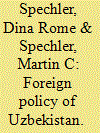

|
|
|
|
|
| Publication |
2010.
|
| Summary/Abstract |
Since 1991 the super-presidential regime of Islam Karimov in Uzbekistan has successfully defended the country's new independence and his authoritarian rule by cleverly enlisting the aid of outside powers such as Russia, China and the USA. With the means afforded by global export of its staple commodities, the regime has preserved stability by managing occasional conflicts with its neighbours, repressing dissenters when necessary, promulgating an ideology of multi-nationalism, and ample spending on health and educational services, as well as on government employees. The current economic crisis has meant the return of many Uzbeks from elsewhere in Asia, but the regime is trying to offset discontent with more spending.
|
|
|
|
|
|
|
|
|
|
|
|
|
|
|
|
| 4 |
ID:
097142
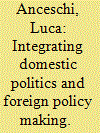

|
|
|
|
|
| Publication |
2010.
|
| Summary/Abstract |
Matters of domestic political consideration exerted a major influence on the processes of foreign policy making established and developed by the authoritarian leaderships of post-Soviet Turkmenistan and Uzbekistan. The preservation of internal authoritarian stability and the political survival of the national regimes have therefore constituted the key foreign policy ends set by decision makers in Ashgabat and Tashkent. This article unveils and discusses the interconnection between domestic politics and foreign policy making in post-Soviet Turkmenistan and Uzbekistan by looking comparatively at the dynamics through which the regimes manipulated foreign policy to consolidate their internal power. In particular, this article will analyse the crucial role played by foreign policy in the regimes' responses to perceived threats to their political stability.
|
|
|
|
|
|
|
|
|
|
|
|
|
|
|
|
| 5 |
ID:
097150
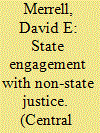

|
|
|
|
|
| Publication |
2010.
|
| Summary/Abstract |
Currently there is a question of whether and how Afghanistan should engage non-state councils of elders to resolve disputes. In order to harness their benefits (e.g. efficiency), control their abuses (e.g. occasional controversial resolutions), and stabilize the resolution of disputes, some have argued that formal links should be established between the state judicial system and non-state councils of elders in Afghanistan. Others argue that mere informal links between the two systems should be established. Still others suggest that prior models of state engagement in Afghanistan should be revived. In Kyrgyzstan, just 65 miles north of Afghanistan, the Tsarist, Soviet and post-Soviet administrations have used various methods to engage non-state councils of elders. Despite these vastly different attempts at controlling local dispute resolutions, elders independently resolved disputes outside of Tsarist and Soviet control and continue to resolve disputes outside of post-Soviet state control in Kyrgyzstan. This phenomenon highlights the need for legitimacy in any models of state engagement that are considered for Afghanistan. If, as observed in Kyrgyzstan, people do not use state-sanctioned local councils in Afghanistan, then their purposes may be frustrated. Therefore, in addition to reviewing the experience with state engagement in other parts of the world, policy makers in Afghanistan should also review the historical and contemporary experience with state engagement in Kyrgyzstan. As the need for legitimacy is reconsidered and applied to the design of models for Afghanistan, it may be more likely that those models will be used by more people in Afghanistan and that their purposes will be furthered.
|
|
|
|
|
|
|
|
|
|
|
|
|
|
|
|
|
|
|
|
|